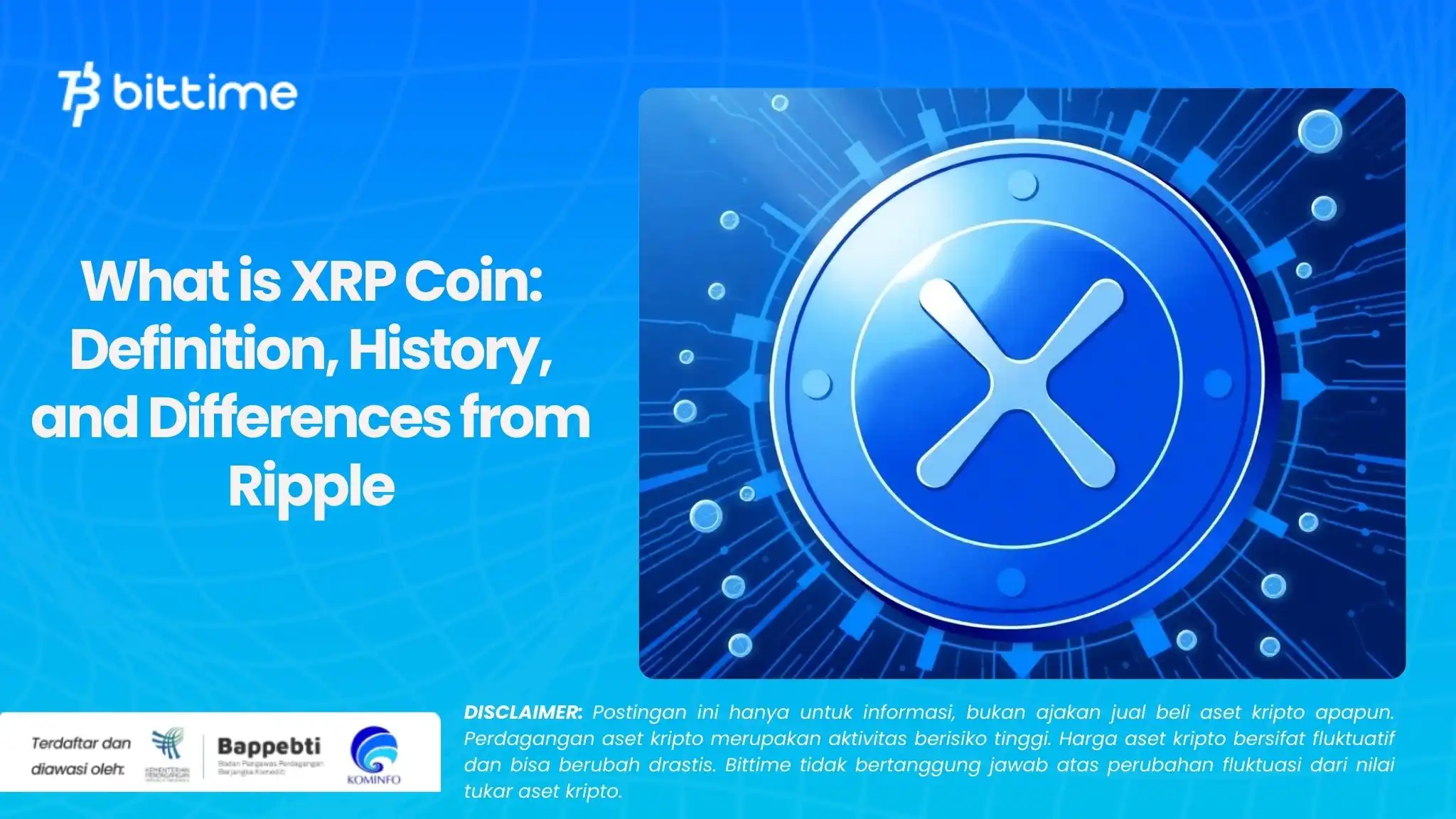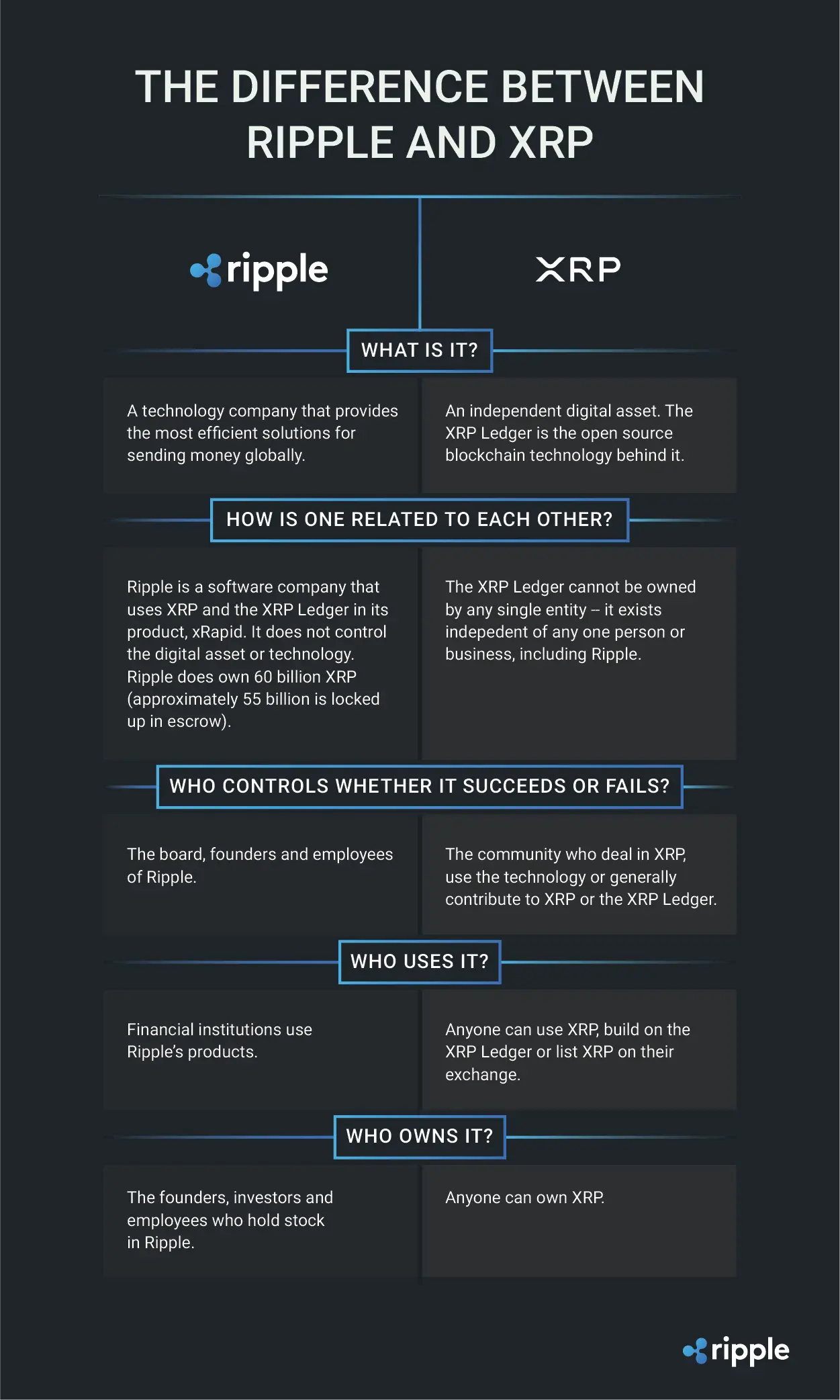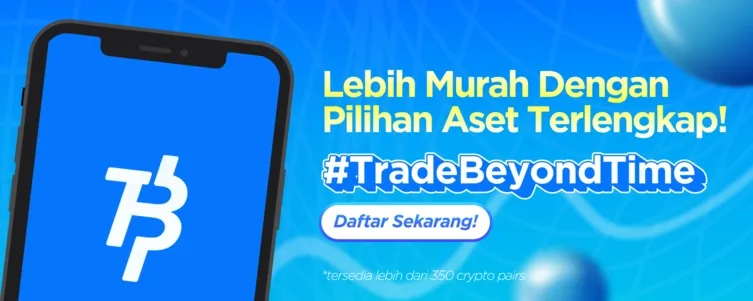What is XRP Coin: Definition, History, and Differences from Ripple
2024-12-03
Bittime - XRP is the native cryptocurrency and token of the XRP Ledger, an open-source blockchain designed to improve global financial transfers and the exchange of multiple currencies.
Additionally, XRP is also used by blockchain services company, Ripple, in their payment platform to facilitate transactions between financial institutions, businesses, and organizations.
History of XRP
Development of the XRP Ledger began in 2011 by Jed McCaleb, David Schwartz, and Arthur Britto as a solution to Bitcoin's existing limitations.
In 2012, the XRP Ledger was launched along with the creation of an XRP token to support its functionality.
After launch, Chris Larsen joined the team, and the Opencoin company was founded.
XRP Goal: Want Easier Transactions
The goal of the XRP Ledger is similar to the vision of Bitcoin creator, Satoshi Nakamoto, namely to create an easier, faster and safer way to carry out transactions globally.
However, XRP is focused more on business use than consumers, although anyone can use it.
Initially the XRP Project was known as Ripple
Originally, this open-source project was known as Ripple, which included XRP (then called “ripples”), Ripple Consensus Ledger, and Ripple Transaction Protocol.
The company Opencoin helped develop the XRP Ledger, which was later renamed Ripple Labs (now known as Ripple).
2020 XRP Ledger (XRPL) Founded for Development and Maintenance of XRP Ledger
In 2020, the XRP Ledger Foundation was established to support the development and maintenance of the XRP Ledger.
Difference XRP Ledger and XRP
Although it is often referred to as Ripple, it is important to understand that XRP is an open-source cryptocurrency that is independent from Ripple (the company).
XRP Operates on the XRP Ledger
XRP operates on a decentralized and open-source blockchain, namely the XRP Ledger (XRPL).
XRP Cannot Be Mined
Unlike many other cryptocurrencies, XRP is pre-mined, with a maximum total supply of 100 billion tokens.
Total XRP Supply
Of the total supply, 80 billion tokens are allocated to Ripple, with 55 billion of them locked in an escrow account to maintain supply stability.
The remaining 20 billion tokens were awarded to Ripple founders and core team. XRP in escrow is planned to be released at a rate of 1 billion per month.

Differences between Ripple and XRP Source: Ripple.com
XRP is Designed for More Efficient Peer-to-peer Networking
XRP is designed as a peer-to-peer trust network that is faster, cheaper, and more energy efficient than some other cryptocurrencies. About 55% of XRP tokens are currently circulating in the market.
XRP is used by Ripple for its transactions
XRP is used by Ripple as a settlement layer to facilitate transactions that occur on Ripple Net, Ripple's commercial platform.
XRP is traded on various exchanges, including spot, futures, and options exchanges.
Read too Is Now the Right Time to Buy XRP?
Difference XRP and Bitcoin (BTC)
While there are some similarities between XRP and Bitcoin, there are many striking differences.
One of them is the consensus mechanism used to validate transactions.
XRP Uses a Consensus Mechanism whereas Bitcoin Proof of Work (PoW)
XRP uses a unique consensus mechanism that relies on trusted validators, whereas Bitcoin uses proof of work that involves mining.
XRP Claimed to be Faster than Bitcoin
XRP is also faster and more energy efficient in processing transactions than Bitcoin.
With the ability to process up to 1,500 transactions per second, XRP Ledger can increase its scalability through Payment Channels, allowing thousands of transactions to be completed at once without disrupting blockchain consensus.
Is XRP Coin a Good Investment?
The decision to invest in XRP depends on your view of the market and other cryptocurrencies.
It's best to consult a financial advisor experienced in cryptocurrencies to determine whether XRP fits your investment goals.
Read too Ripple (XRP) Price Prediction: Can It Reach $3 per Coin?
Conclusion
XRP remains one of the top cryptocurrencies by market capitalization.
As a native token of the blockchain that functions for transactions and investments, XRP offers exciting potential.
However, it is important not to invest more than you can afford to lose.
FAQ
What Is XRP Used For?
XRP is used as a means of payment and transaction settlement on the Ripple Net network, which facilitates money transfers between financial institutions, businesses and organizations.
XRP also serves to increase liquidity in cross-border transactions and reduce costs and time required for settlement.
Whose XRP Coin Does It Own?
XRP is a token developed by the company Ripple Labs Inc.
Although Ripple owns the majority of the XRP supply, the token operates on an open-source blockchain network and is not owned by a single entity.
What is the Highest Price of XRP?
The highest price of XRP reached $3.40 in January 2018.
Since then, the price of XRP has experienced significant fluctuations, influenced by various market and regulatory factors.
How to Buy Crypto on Bittime

Want to trade sell buy Bitcoins and crypto investment easily? Bittime is here to help! As an Indonesian crypto exchange officially registered with Bappebti, Bittime ensures every transaction is safe and fast.
Start with registration and identity verification, then make a minimum deposit of IDR 10,000. After that, you can immediately buy your favorite digital assets!
Check the exchange rate BTC to IDR, ETH to IDR, SOL to IDR and other crypto assets to find out today's crypto market trends in real-time on Bittime.
Also, visit the Bittime Blog for interesting updates and educational information about the crypto world. Find reliable articles about Web3, blockchain technology, and digital asset investment tips designed to enrich your crypto knowledge.
Reference
Tobi Opeyemi Amure, What Is XRP?, Accessed December 3, 2024
Team Ripple, The Difference Between Ripple and XRP, Accessed December 3, 2024
Author: IN
Disclaimer: The views expressed belong exclusively to the author and do not reflect the views of this platform. This platform and its affiliates disclaim any responsibility for the accuracy or suitability of the information provided. It is for informational purposes only and not intended as financial or investment advice.



